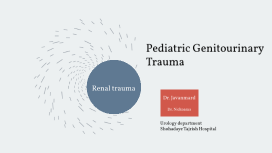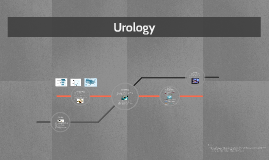Urology
Transcript: Olivia Landau Urology 2nd Place - Twix 1st Place - M&Ms 3rd Place - Skittles What is Urology? SUMMARY Study of the Urinary system. Conditions a Urologist deals with: Adrenal gland conditions Bladder conditions and bladder leakage Cancer Genital birth defects Kidney conditions Penis and testis conditions Prostate conditions Urinary tract birth defects Example Condition Example condition Urotrauma Injury to the urinary tract or reproductive organ example condition 1 Symptoms can include: Dehydration, a weak/no urine stream, blood in urine, etc. Erectile Dysfunction Most common sex problem that men report to their Dr. "ED is defined as trouble getting or keep an erection that's firm enough for sex." example condition 2 Causes: Being over 50, being obese, smoking, etc. Symptoms include: low self-esteem, depression, mood changes,etc. FOCUS AREA 1 Education A Urologist does the following: Diagnose and treat diseases/disorders of the genitourinary organs and tracts Perform abdominal,pelvic, or retroperitoneal surgeries. Minimum Education *Obtain knowledge and specialize in both male and female genitourinary organs and tracts * Minimum education requirements Five years minimum as a urology resident Two-year minimum as a general surgery resident Three years focusing on general urology residency Roughly 13 years total Main courses Anatomy & Physiology Functional systems Medical cell biology Infectious disease Psychopathology Immunology Microbiology Bio chemistry & Genetics Behavioral sciences and medicine At least 3.8 to stay in most medical programs!! Must have: High School Diploma College choices School Choices University at Buffalo Tuition - $21,510 for a full-time resident John Hopkins Tuition - $48,710 FOCUS AREA 2 Qualifications Personality Required Skills Personality says it all... INTJ Excellent critical thinking skills Discipline & Attention to detail Driven to excel in subjects they are interested in Logical thinking Yes, because I am an Introvert Am I qualified for this Career? Focusing on the big picture Intellectual creativity Required Skills Good organizational Skills Excellent communication skills Ability to deal effectively with people of all ages Ability to lead and manage a team effectively Ability to cope with a busy and demanding role EMT training Not required: CNA certification But helpful FOCUS AREA 3 Pay & Future Outlook Salary $208,000 - $100/hour Payscale.com Salary: $151,758 - $470,830 Bonus: $7,946-$114,720 Benefits Sick/paid leave Vacation days Medical insurance Helping those in need!!! Lifestyle Salary would be beneficial to have a mid-size family Live comfortably Fast-paced lifestyle Could be in a superior position #1 #2 #3 There will always be a need for urologist Medicine and it's technology is always advancing Future Outlook There will always be research to be done https://www.onetonline.org Sources Https://www.urologyhealth.org/urologic-conditions Https://www.payscale.com

















